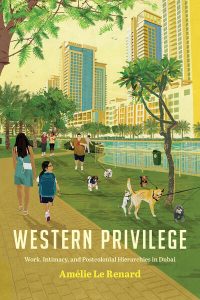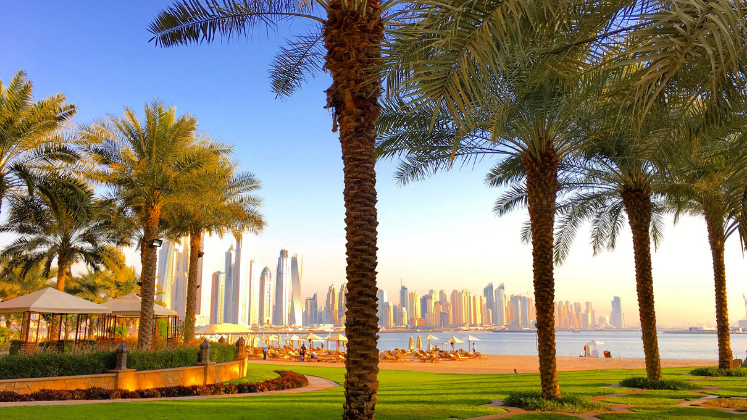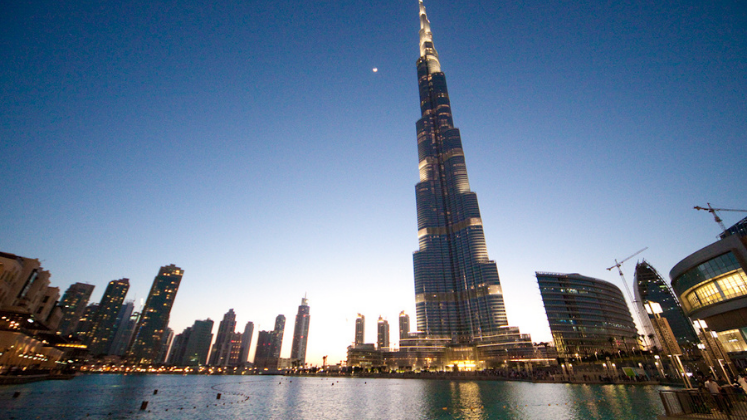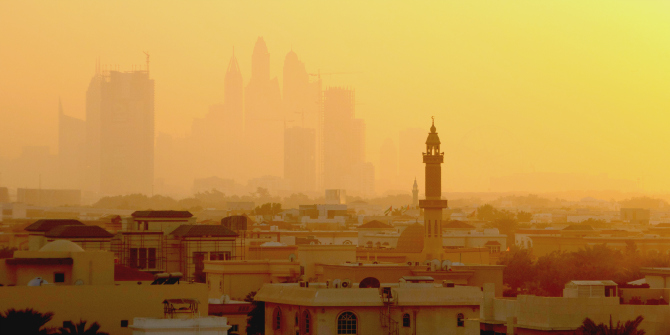In Western Privilege: Work, Intimacy, and Postcolonial Hierarchies in Dubai, Amélie Le Renard explores the organisation of social life in Dubai, focusing on the experiences of mobile Western passport holders and the advantages and identifications that construct the status of a ‘Westerner’. Providing insights into how Westernness is conditioned and shaped by gender, race and class, this book is essential reading for scholars of migration as well as ethnic and race studies, writes Liina Mustonen.
Western Privilege: Work, Intimacy, and Postcolonial Hierarchies in Dubai. Amélie Le Renard (trans. by Jane Kuntz). Stanford University Press. 2021.
 Find this book (affiliate link):
Find this book (affiliate link): ![]()
Amélie Le Renard’s Western Privilege: Work, Intimacy, and Postcolonial Hierarchies in Dubai not only makes an important contribution to the field of Middle Eastern studies by taking a postcolonial approach to analysing the organisation of social life in one of the Emirates. The book’s focus on mobile Western passport holders in Dubai also makes it essential reading for scholars of migration as well as ethnic and race studies.
Through narratives of 98 residents of Dubai, collected in interviews, Le Renard studies the advantages and identifications that construct the status of a Westerner along the intersecting lines of class, gender and race (3) in a city that she considers a ‘strategic site of inquiry into reconfigurations of social hierarchy at a global scale’ (1).
Contrary to the low-skilled migrant workers from Asian countries, who built the ‘giant spa’ (36) where Western passport holders can enjoy hedonistic lifestyles, Le Renard’s interview partners occupied high-skilled jobs. They worked in various sectors such as human resources, sales, marketing, communications, finance, logistics and urban planning (50). 58 had a French passport, while 19 had another Western nationality and 21 interviewees had a non-Western passport. The focus on French passport holders is justified given their significant role in Dubai as the second largest group of Westerners after the British at the time of the research. This set of interviews allows the author to explore the overlaps of Westernness and whiteness in Dubai’s postcolonial context.

Image Credit: Photo by Vangelis Kovu on Unsplash
The first chapter illustrates how professional skills are constructed as ‘Western’. The author points to the associated global hierarchy and its colonial history – during the British protectorate (which ended in 1971), Westerners enjoyed considerable structural advantages (26). In contemporary Dubai, like many other places, the (male) Westerner embodies the figure of an erudite and skilled worker. As a result of this image, Westerners not only occupy the most highly qualified jobs, but they also enjoy legal privileges as the United Arab Emirates grants them short-term visa-free stays (32). Yet, despite their luxurious upper-class lifestyles, they still remain ‘temporary workers’ and need to live with the uncertainties of Dubai’s neoliberal job market that allows layoffs at short notice.
Chapter Two advances the discussion of structural privileges associated with a Western passport in the job market. Positive stereotypes attached to Western nationalities and whiteness make Westerners racialised to their benefit (49). Le Renard’s interviews reveal how Dubai-based companies used Western nationalities in their branding. Executive positions were frequently held by men with Western passports (50) and the companies’ salary offers prioritised Western passport holders. Differences in salaries were also justified through a hierarchy of educational institutions – individuals who had earned their degrees in Western countries were considered the most competent (52). According to Le Renard, this hierarchy makes Western passports desired commodities for Middle Eastern and North African elites (65). Such instrumental use of Western passports by the region’s elites, Le Renard notes, has an unsettling impact on the link between Westernness and whiteness (67).
Chapter Three reveals how structural advantages related to Western nationality come with certain performative expectations that particularly constrain the social life of non-white Western passport holders (82). Expectations of ‘essentialized Westernness’ (74) include specific sartorial attire, speaking English with a European or American accent and hiding one’s affiliations with Islam. The author illustrates how behind the image of Dubai’s foreign inhabitants as ‘fair or olive-complexioned blond women or fair-complexioned men’ (76) lies various technologies aimed at shaping bodies along gendered and heteronormative expectations such as gyms and spas (93).
Chapters Four to Six explore the ways in which Dubai’s Western passport holders organise and make sense of their intimate lives. Against the backdrop of widespread anti-black and anti-Muslim racism, it does not come as a surprise that white guest families distance themselves from other groups of Dubai residents. Discursive distancing accompanies spatial distancing. White Western passport holders reside in an enclave that excludes non-white people including those with Western passports (118).
Although many Western women stayed home and were dependent on their working husbands, their self-representation reflected past colonial patterns of thinking as they considered themselves more emancipated than the Emirati women (117). Similarly, despite the fact that they readily enjoyed services that freed them from traditional housework, in Le Renard’s interviews Western women constructed themselves as more egalitarian and considered hiring a ‘live-in maid’ as an act of charity. Yet, the same practice among the Emiratis was considered an act of slave-holding (137).
Similar ‘othering’ discourses existed among Western single people for whom Dubai offers a hedonistic lifestyle. Although such a lifestyle – materialising in lavish parties and nightclubs – is governed by heteronormativity and Dubai’s surveillance system, for Westerners it is also a way to distinguish themselves from those who are considered less liberated (158).
Chapter Seven zooms in on the overlaps and differences between Western privilege and white privilege. This part of the book needs to be read against the dominant class structure as well as anti-black and anti-Muslim racism in France. The experiences of non-white French passport holders differ from white French passport holders. People of colour experienced Dubai positively: they felt that they could ‘reconcile their plural affiliations and live them fully’ (169), their class positions improved and they found the city’s multinational environment and religious freedom ‘emancipating’ compared to their life in France (172) that was constrained by structural racism (201).
The conspicuous consumption and lavish lifestyle that Westerners enjoy in Dubai connects wealth to Westernness. Although people of colour enjoy the privileges associated with their Western passports, the author concludes that for them ‘the experience of Western privilege seems fleeting or even reversible’ (198). White people, in turn, while exceptionalising and exoticising Dubai’s society, consider themselves as outsiders to its social order, thereby constructing whiteness as the norm that does not need to be explained (189).
The contributions of Western Privilege are manifold. It deconstructs the notion of ‘Western’ that is too often used as a self-explanatory category in the social sciences. The book’s major contribution is that it articulates the obvious – Westerners do not exist outside of Dubai’s social order. To the contrary, they actively contribute to it. Privilege is always relational and the book sheds light on this relationality. Westerners’ affluent and luxurious lifestyles should be viewed in relation to the lives of Dubai’s other residents – people in low-skilled jobs – who provide the infrastructure of care necessary for the maintenance of such lifestyles. While children of Westerners often visit expensive international schools, those in low-skilled jobs are prevented from bringing their dependents to Dubai. In the parlance of Dubai’s Westerners, the social inequality that characterises almost every aspect of social life is accepted through the denial of coevalness and interconnection (128). According to this vision, the Emiratis are positioned as being at a different developmental stage. Exploitation is thus inevitable (129).
Western Privilege is not based on a long-term ethnography. The author mentions her discomfort in the field which prevented her from spending longer periods in Dubai. While she benefitted from the same structural privileges as her interviewees, her political convictions resulted in permanent unease during the fieldwork. More ethnographic details would perhaps illustrate some of the tensions between verbal accounts and the actual interactions between Westerners and other groups. The fact that no Eastern European passport holders were among the interviewees is also telling. Were they not considered Western? The inclusion of Eastern Europeans would disclose more nuanced information about how the categories of whiteness and Westernness operate in Dubai and how Dubai’s hierarchies of migrant workers differ from those of other global cities.
The book’s focus on French passport holders also complicates the generalisations of the categories of whiteness and Westernness. One wonders whether the French passport holders embraced all other Western nationalities in their circles? Some of the assumptions, such as the divide between old and new money as developed in Chapter Seven, are indeed specific to France and other select European societies. As scholars working on elites have shown, bound to time and space, the elite finds new ways to distinguish themselves from those they consider socially inferior.
Western Privilege contributes to a discussion about Western hegemony by showing how Westernness and whiteness organise social life in a non-Western context. Moreover, the use of a postcolonial feminist approach allows the author to provide insights into how Westernness is conditioned and shaped by gender, race and class. Besides its scholarly contributions, the book will hopefully prompt those who self-identify as Westerners in the Middle Eastern context to critically examine their own contributions to the social order in question.
Note: This review gives the views of the author, and not the position of the LSE Review of Books blog, or of the London School of Economics and Political Science. The LSE RB blog may receive a small commission if you choose to make a purchase through the above Amazon affiliate link. This is entirely independent of the coverage of the book on LSE Review of Books.







